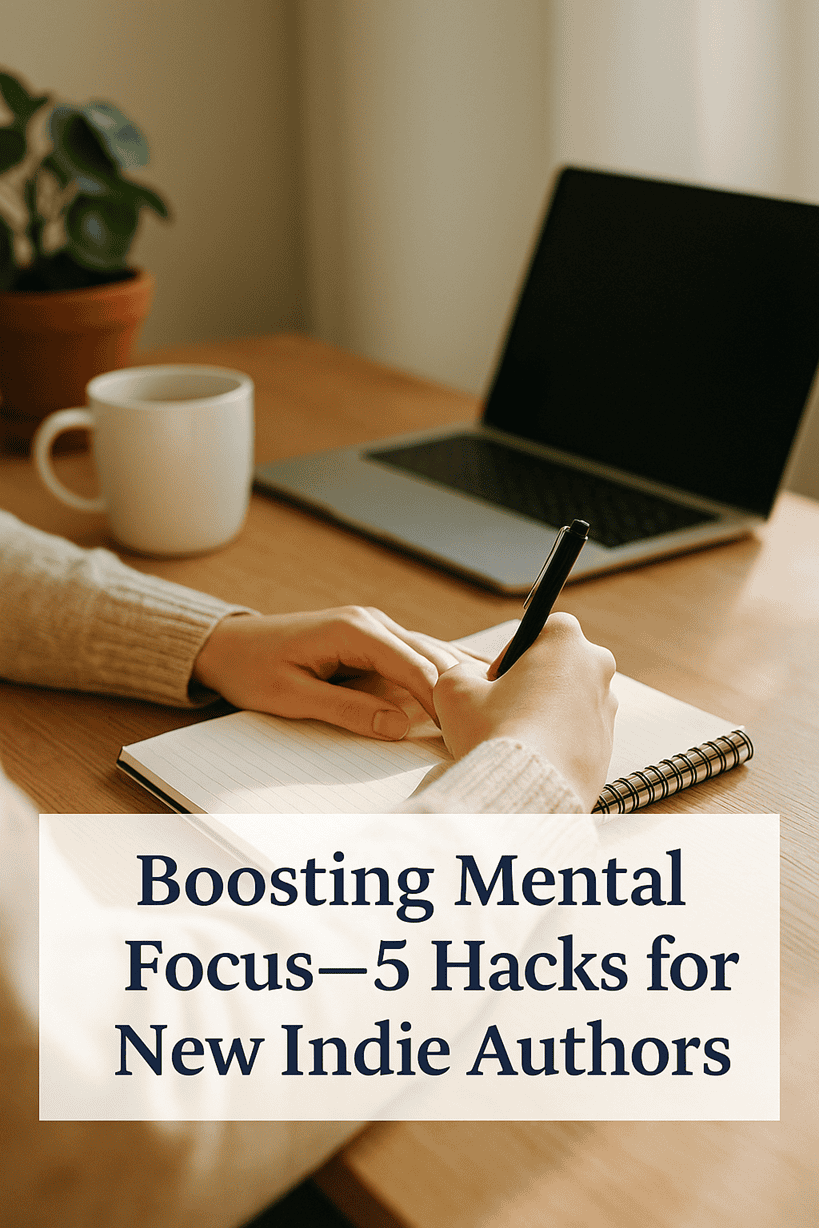Boosting Mental Focus—5 Hacks for New Indie Authors
“Almost everything will work again if you unplug it for a few minutes… including you.” — Anne Lamott, author, Bird by Bird
As a new indie author, clarity and sustained mental focus are two of your most valuable author tools. Whether you’re outlining your novel, tackling revisions, or drafting marketing content, your ability to stay mentally sharp can make or break your momentum. This writer’s guide explores simple, effective daily lifestyle habits that can help you boost mental focus naturally. No gimmicks, no supplements, just practical knowledge that can lead to long-term improvements in your writing productivity and quality.
1. Movement & Exercise
Common Examples: Morning walks, stretching, yoga, short home workouts, or dancing.
Key Mental Focus Benefits:
- Increases blood flow to the brain
- Enhances mood and alertness
- Reduces mental fatigue and brain fog
How It Supports Focus:
Physical activity releases endorphins and improves oxygen flow, which boosts cognitive performance. Even a brisk 10-minute walk can sharpen your mind before a writing session.
Considerations:
You don’t need a complete workout. Set a timer and move your body for 5–15 minutes to reset your focus during long writing blocks.
2. Mindfulness & Meditation
Common examples include deep breathing, guided meditations, journaling, silent reflection, and gratitude practice.
Key Mental Focus Benefits:
- Reduces stress and anxiety
- Improves attention span
- Enhances decision-making
How It Supports Focus:
Mindfulness practices help quiet the mental chatter that distracts you from writing. When you train your brain to be present, your concentration naturally improves.
Considerations:
Start small. Try 2 minutes of deep breathing between tasks. Apps like Calm, Headspace, or even YouTube videos can guide you.
3. Intentional Nutrition
Common Examples: Protein-rich breakfasts, omega-3s from fish or flax, dark leafy greens, nuts, water
Key Mental Focus Benefits:
- Stabilizes energy levels
- Prevents mental crashes
- Fuels brain function
How It Supports Focus:
Foods rich in healthy fats, proteins, and antioxidants support neurotransmitter activity. Staying hydrated is also crucial—dehydration leads to sluggish thinking.
Considerations:
Avoid relying on sugar or caffeine alone. Keep brain-friendly snacks nearby while writing (e.g., almonds, blueberries, or a boiled egg).
4. Focused Work Rituals
Common Examples: Pomodoro technique, ambient soundtracks, habit stacking, designated writing hours
Key Mental Focus Benefits:
- Trains your brain for deep work
- Builds sustainable focus habits
- Reduces context switching
How It Supports Focus:
Creating a reliable routine signals your brain that it’s time to work. Paired with ambient tools (like brown noise or instrumental music), rituals help deepen your concentration.
Considerations:
Experiment until you find what works—some authors thrive with structure, others with creative freedom. The key is to start with one consistent habit.
5. Sleep & Rest
Common Examples: Regular sleep schedule, short afternoon naps, screen-free wind-down routine
Key Mental Focus Benefits:
- Enhances memory and creativity
- Supports emotional regulation
- Prevents burnout and attention fatigue
How It Supports Focus:
Sleep isn’t just rest—it’s a powerful cognitive reset. Your brain consolidates learning while you sleep, preparing you for high-focus tasks like writing and editing.
Considerations:
Try going to bed and waking up at the same time every day. Avoid screens 30–60 minutes before bed to improve sleep quality.
Protecting Your Mental Focus: A Creative Investment
Mental focus doesn’t have to be elusive. By adopting just a few of these daily habits, you’re investing in your creative output and building the stamina needed for the indie author journey. Start where you are and grow from there. Your stories and your readers will thank you for it.
Ready to transform your writing sessions into focused, high-impact work sprints? Start using these five focus hacks today and take the first step toward building a productive, energized writing habit. Want more tips and support like this? Explore more writing productivity tips and publishing guides at KickAssWritersGuide.com.
We hope you’ve found the writer’s guide strategies helpful and motivating. We hope they’ll equip you with the insights and tools needed to help you succeed as a new author.
For more guidance, see other writers’ guides, such as AI Empowers New Indie Authors: 5 Best Hacks. You might also like Outcome-Based Management: 7 Steps to Writing Success.
Writing is a journey of continuous learning and improvement. You don’t have to go it alone. We’re excited to continue the journey with you, providing guidance and encouragement every step of the way. Our goal is to provide essential insights and practical advice to help you navigate the writing world with increased confidence.
If you have a draft you want to publish and are wondering how AI can help, read it. Is Your Book Ready to Self-Publish? Lastly, for help writing a non-fiction book, read Write Your First Non-Fiction eBook: a 30-Day Workbook for Getting It Done.
Don’t wait. Start today!
How can we help? To let us know, please fill out our Contact form. Happy writing!
Quick Checklist for Boosting Mental Focus
Print this checklist and tape it to your workspace for daily focus support.
Start with a Brain-Friendly Morning Routine:
Hydrate, stretch, and limit screen time for the first 30 minutes.
Use the Pomodoro Technique:
Write in focused 25-minute blocks with 5-minute breaks.
Eat for Focus:
Choose brain-fueling snacks like nuts, berries, or avocados.
Tame Tech Distractions:
Use focus apps like Forest or Freedom to block social media while writing.
Set Micro-Goals:
Break big writing tasks into small, doable targets to avoid overwhelm.
#


